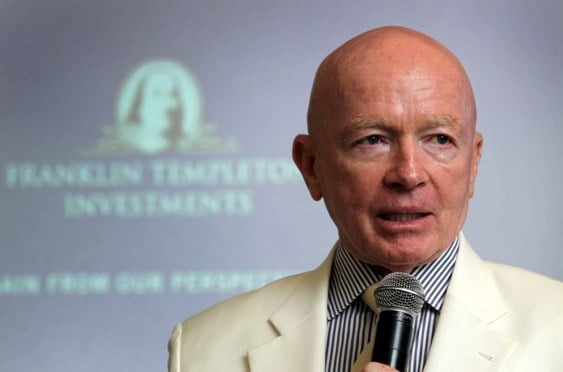Currency and stocks should see boost if debt-ceiling is not raised, Templeton boss predicts
Mark Mobius, executive chairman of Templeton Asset Management's emerging markets group, said a U.S. failure to raise the debt limit would spur inflows to Asia's currencies and stocks.
“Look at the dollar index during the sub-prime crisis, everyone was rushing out of the dollar,” Mobius told reporters at a briefing in Manila. If U.S. lawmakers “don't extend the debt ceiling it will be quite positive for the demand of other currencies” and emerging-market equities as investors seek to diversify, said Mobius, who helps manages $54 billion.
U.S. House Speaker John Boehner plans to press ahead with a two-step debt-limit extension that President Barack Obama has threatened to veto, fueling concern the nation is lurching toward a default as early as Aug. 2 and jeopardizing its AAA credit rating.
The Dollar Index, which tracks the currency against its six major counterparts, dropped as much as 0.3 percent today. It sank to a record closing low of 71.33 in April 2008 as the collapse of the U.S. sub-prime-mortgage market prompted the Federal Reserve to cut interest rates to support the economy.
Asia and other emerging markets would attract funds because of their lower debt-to-gross domestic product ratios and higher foreign-exchange reserves relative to developed markets, Mobius said. A stronger currency may lead to an “export problem, but it's no longer a matter of pricing,” he said. “A lot of these countries have moved upmarket.”
Confident on Agreement
Secretary of State Hillary Clinton reassured China, the top holder of American debt, today that the U.S. will resolve the impasse, while People's Bank of China adviser Xia Bin said he remains confident an agreement will be reached. Boehner aims to unveil his plan as early as today, when he was to update Republicans in a closed-door meeting.
The MSCI All-Country World Index, which measures both developed and developing nations, sank 0.3 percent today as U.S. and European debt concerns hurt investor confidence. Greece's credit rating was cut three steps by Moody's Investors Service, which said a European Union's rescue for the nation will cause “substantial” losses for investors.
European and U.S. debt concerns are the “biggest immediate risk” to emerging-market stocks, Mobius said at an evening forum in Manila today. “It's already creating uncertainty.”
The MSCI Emerging Markets Index has dropped 0.5 percent this year, trailing a 5.2 percent gain in the MSCI World Index of developed markets, as central banks from China to India raised interest rates to curb inflation. Stocks in the index for emerging equities are valued at 10.9 times estimated profit, less than the multiple of 12.9 for developed countries.
“Most opportunities” in emerging markets are in Asia, Mobius said. Philippine stocks are “relatively” expensive, he said. “We'd like to put money in here if stocks were cheaper.”
The Philippine Stock Exchange Index has rallied 31 percent in the past 12 months, sending valuations to 14.8 times estimated profit, the highest level this year, according to data compiled by Bloomberg.
--Bloomberg News--







